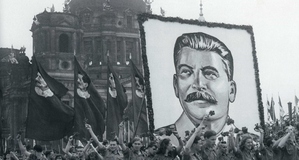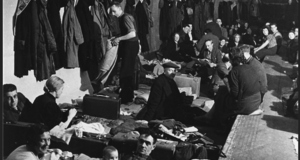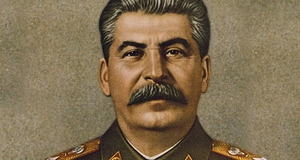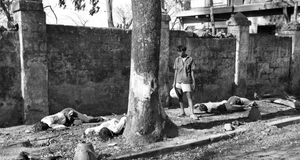Featured Article:The Legacy of International Cooperation at the Nuremberg Trials
By
2011, Vol. 3 No. 10 | pg. 1/2 | »
IN THIS ARTICLE
KEYWORDS
On November 21, 1945, Robert H. Jackson, the Chief Prosecutor for the United States of America opened the prosecution’s case against German defendants in Nuremberg, Germany. The war in Europe had ended only six months earlier, many of the buildings in Nuremberg and the rest of Germany still bearing the physical scars of bombing raids and the Allied invasion. Before this massive trial could proceed, the victorious Allied powers drew up a charter for the International Military Tribunal, defining the rules of procedure, the charges of the indictment and the defendants to be prosecuted. The Allied powers were already debating the punishment of the Axis leadership—German and Japanese—before the war had concluded. Tensions between leaders of Great Britain, France, the United States and the Soviet Union complicated this process at every turn, but despite this, the trial at Nuremberg emerged as an important precedent in international law and human rights. The major sources of tension stemmed from the debate as to the possibilities of either carrying out summary executions of Nazi leaders or putting them on trial (fairly) for war crimes, choosing the defendants to be tried, negotiating the charges of the indictment, and the problematic aspect in allowing the Soviets to prosecute the Germans for war crimes, despite their complicity in committing some of the acts for which the Nazis were accused. “Never before in legal history has an effort been made to bring within the scope of a single litigation the developments of a decade, covering a whole continent, and involving a score of nations, countless individuals, and innumerable events. Despite the magnitude of the task, the world has demanded immediate action.”[1]
Nuremberg is located in southern Germany, and during the Nazi regime, had been a mass rallying point for the leadership. “Nuremberg,” wrote Stephan Landsman, “had been the epicenter of the Nazi movement… [and] in its streets and stadiums jubilant Nazis had marched and rallied.”2 The city fit the needs for the trial and all the powers agreed to its setting, even though Soviets had argued in favor of Berlin initially—located in their zone of occupation rather than the American-occupied Nuremberg. The trial itself commenced on November 21, 1945 and continued until October 1, 1946. Twelve smaller trials were held subsequently between 1946 and 1949, but they were not prosecuted jointly by the Allied powers but rather only by the American prosecution under the direction of Telford Taylor, who had worked on Robert Jackson’s staff during the first trial. Allied powers had been negotiating the fate of the Nazi leaders since the first meeting of American President Franklin Roosevelt, British Prime Minister Winston Churchill and Soviet Union leader Joseph Stalin in Tehran, Iran. As the war in Europe began to draw to an end in early 1945, these negotiations continued until all powers agreed to a trial, the procedure of which was to be decided at a later date. Robert Jackson, a member of the U.S. Supreme Court, was appointed as the Chief Prosecutor and his vision dominated the proceedings. He had been advocating retribution against the Nazi leadership even before the American entry into the war. In 1941, shortly before Japan bombed Pearl Harbor, Jackson spoke at a meeting of the American Bar Association. “It is [a] grave thing to perpetuate by our inaction an anarchic international condition in which every State may go to war with impunity whenever its interests are thought to be served.”3 The other members of the prosecution were Sir Hartley Shawcross (Great Britain), Lieutenant-General Roman Andreyevich Rudenko (Soviet Union) and François de Menthon (France). Each man had a staff working under them—Jackson, at various times, was directing over a hundred people. These delegates negotiated the International Military Tribunal Charter which established the rules of procedure. Each Allied power had two judges, one of which served as an alternate. The head judge was not American, but rather British Sir Geoffrey Lawrence, in an effort to balance the perceived power held by the Americans in the process. Sir Norman Birkett served as his alternate. Other members of the judge panel: Major General Iona Nikitchenko (Soviet), Lieutenant-Colonel Alexander Volchkov (Soviet alternate), Francis Biddle (America), John J. Parker (American alternate), Professor Henri Donnedieu de Vabres (French), and Robert Falco (French alternate). Despite ideological and interpersonal tensions, the International Military Tribunal met in London in the summer of 1945 to hammer out the nuts and bolts of procedure and to formulate the indictment. These negotiations lasted mere months, resulting in the trial opening only a little over six months after Germany’s formal surrender on May 8, 1945, illustrating that the primary goal was to hold these trials and that they would not be delayed by any of the foreign powers. In 1947, American prosecutor, Thomas J. Dodd wrote:
Nuremberg and International LawIt was an unprecedented prospect to prosecute a nation’s leadership for crimes committed during war. Earlier leaders had been executed, exiled, or had returned to power, suffering little for having waged war. The International Military Tribunal sought to change that, challenging what Stefan Glaser would, in 1948, term “state sovereignty.”5 He went on to elaborate on this concept: “the Charter recognized individuals as subjects of international law… [and] broke with the doctrine of immunity for what is called an ‘act of State.’” In other words, the Allies were asserting that the old days of war for territorial expansion, a time-honored tradition in Western civilization, were over and any nation that persisted in the old ways would be punished. An international prosecution had been discussed at the end of World War I and provisions for such were made in the Treaty of Versailles, but the European powers had eventually allowed Germany to prosecute its own war criminals in order to preserve the stability of the Weimar Republic. Those who did go to trial were either acquitted or received lenient sentences. This could not be allowed to happen again. Henry L. Stimson, the Secretary of War under President Franklin Roosevelt wrote, “International law is not a body of authoritative codes or statutes; it is the gradual expression, case by case of the moral judgments of the civilized world.” 6 The law used at Nuremberg was not created specifically for the purposes of the trial, but merged the very different legal processes used in the continental and in the Anglo-American courtrooms, balancing the adversarial cross-examinations of the United States with the prominence of magistrates in Europe. “The concept of an international trial, with judges and lawyers from different nations overcoming obstacles of languages, custom and procedure,” is the most enduring of Nuremberg’s legacies according to Ehrenfreund. 7 The international law that concerned the Tribunal stemmed both from the Geneva Protocol of 1924 and the Kellogg-Briand Pact of 1928. The Geneva Protocol had been negotiated by the League of Nations and stated “a war of aggression constitutes a violation of this solidarity and an international crime.” 8 The Kellogg-Briand Pact, signed in 1928 by sixty nations including Germany, spoke along the same lines. “The High Contracting Parties agree that the settlement of solution of all disputes or conflicts of whatever kind or nature or of whatever origin they may be, which may arise among them, shall never be sought except by pacific means.”9 These agreements were the basis for the criminal account of aggressive war. Having specifically agreed not to wage a war of conquest, the Nazi’s approach to expansion in the 1930s and 1940s violated this, therefore they could be prosecuted. These pacts made the acts illegal, but punishments were either absent or vague. Jackson aimed to change this with the indictment. Summary Execution or Presumption of Innocence: Punishments for Nazi Leadership
President Roosevelt, British Prime Minister Winston Churchill and Soviet Union leader Joseph Stalin had met several times during the war to discuss strategies for fighting the war and plans for the Nazis afterwards. The leaders issued the Moscow Declaration of November 1943, which agreed that “without prejudice to the case of the major war criminals whose offenses have no particular geographic location and who will be punished by joint decision of the Governments of the Allies.”11 This joint decision would be one of the first areas of disagreement for the Allied powers. Roosevelt and Churchill, in particular, were vacillating between summary executions of the primary leaders and putting them and lower-level Germans on trial. Roosevelt’s own administration was divided into two distinct groups—the Treasury Department headed by Henry Morgenthau, Jr., which wanted summary executions, and the War Department, led by Henry L. Stimson who favored the trials. Stimson argued that a trial would “afford the most effective way of making a record of the Nazi system of terrorism and of the effort of the Allies to terminate the system and prevent its recurrence.”12 This disagreement led to tension within the Cabinet, with Morgenthau and Stimson firing off memos dedicated to each side, hoping to swing Roosevelt their way. At one point, after a conference in Quebec, Roosevelt agreed to Morgenthau’s drastic plan for Germany—summary executions for leaders, and the removal of heavy industry, turning the land into one large agricultural farm. “I want to make Germany so impotent,” Morgenthau said in his memorandum, “that she cannot forge the tools of war.”13 Germany, under Morgenthau's plan, would never be able to pursue an aggressive war again. Stimson’s view won the day, and Roosevelt agreed to pursue a trial. He died on April 12, 1945, just before the end of the war in Europe, but his replacement, Harry Truman, was enthusiastic in his support for a fair trial. He was impressed by a speech Jackson had delivered the evening after Roosevelt’s death. “You must put no man on trial,” Jackson had said, “under forms of a judicial proceeding if you are not willing to see him freed it not proven guilty…the world yields no respect for courts that are organized merely to convict.”14 America, at first, was the only Allied power to advocate putting the Nazi leaders on trial. Now that the country had decided to go forward, they--and Jackson, in particular—were adamant. There would be no international compromise in this matter. The British were initially in favor of executing Nazi leaders outright. They had suffered more than the Americans, almost as much as the French. The evidence of devastating aerial bombings still littered the countryside. “Hitler and his gang,” Ehrenfreund wrote regarding Churchill’s opinion, “had forfeited any right to legal procedure.”15 The Soviet Union was not diametrically opposed to a trial, having already carried out the Kharkov trial in which three Germans and a Russian were tried for various war crimes. The other Allies had not been consulted before, during, or after this trial and were reluctant to link it to the Declaration in Moscow that had promised a joint Allied punishment of the Germans. “The British Foreign Office maintained,” Kochavi wrote, “that the relevant passages of the Moscow Declaration meant that the time of an armistice with Germany, those who had committed war crimes would be apprehended and sent to stand trials in the countries where the crimes had been committed.” 16 The Russians were proponents of using trials to justify many of their actions, such as the post-war purge of high Communist party officials for which Stalin would infamous. Stimson later wrote, “We have to the Nazis what they denied their own opponents—the protection of the Law.”17 The first major compromise of the Nuremberg trials had been reached—there would be a legal proceeding in which the governments of the victorious powers would hold the Germans accountable for their actions. Norbert Ehrenfreund, a World War II veteran and a member of the press at Nuremberg wrote, “Now we might consider adding another historic moment to the list [which included the Magna Carta, Declaration of Independence, etc.], a moment that almost never happened: the decision in London to have a fair trial in Nuremberg…a splendid victory for Robert Jackson, an even greater victory for humanity.”18 The Nuremberg Indictment: Determining Guilt and Retroactive JusticeThe indictment at Nuremberg was a symbol of the international cooperation—the Allied powers having had to compromise in several areas in order to proceed. The Allies negotiated which defendants to include the indictment, agreeing on twenty-four individuals that had held military and industrial positions in Germany during the Nazi regime. The British had not wanted to include Hjalmar Schacht, who had held various economic-related positions in the Third Reich, but faced resistance from the other Allies, “especially from the French who showed strong hostility to German industrial and economic leaders.”19 Other defendants were easier to select—Hermann Göring, seen as second-in-command to Hitler; Rudolf Hess, a commandant at Auschwitz; and Wilhelm Keitel, chief of the Armed forces. One of the defendants, Gustav Krupp, had to be removed early in the proceedings due to his mental incompetence, a troubling prospect for Jackson. His response was to petition the court to prosecute Gustav’s son, Alfried Krupp, instead. General Telford Taylor related Jackson’s position: “The firm of Krupp had made weapons for four generations and it was their weapons that had made Europe a battle ground…Krupp typified the sinister forces which he, Mr. Justice Jackson, was sent to Europe to punish.”20 The British also petitioned the court, but their solution was to try Gustav in absentia. The Soviets took no position while the French straddled the line between the American and British views: if they could not have Gustav, either in presence or in absentia, they wanted his son. “France is formally opposed,” Charles Dubost submitted, “to dropping the firm of Krupp from the Trial since the other prosecutors do not contemplate the possibility of preparing at this time a second trial directed against the big German industrialists.”21 All arguments were eventually rejected, and Gustav was removed from consideration. Alfried was, however, tried during one of the subsequent Nuremberg trials. Alfried was defended by a veteran of the first trials, Otto Kranzbühler who had defended Admiral Doenitz, and was able to convince the judge to drop the charges of aggressive war, the most serious charge Alfried and the other Krupp executives faced. Judge Andersen’s explanation doing so aided the definition of aggressive war: “the charge of planning or waging aggressive war must be limited to leaders and policymakers and could not be extended to private citizens like Krupp who participate in the war effort but have little voice or control in the conduct of the war.”22 Twenty-two defendants were eventually charged of the various counts of the indictment, including those already named as well as Albert Speer, who had been the minister of armaments; Alfred Jodl, Chief of Army Operations; Franz von Papen, former Vice-Chancellor; Joachim von Ribbentrop, Foreign Minister; and Hans Franck, Nazi governor of Poland. One of which, Martin Bormann, had fled Germany and was never found. He would eventually be declared dead in the 1970s by West Germany. Twelve men were sentenced to death by hanging, three men received life sentences, four men prison terms ranging from ten to twenty years in prison, and two (Hjalmar Schacht and Hans Fritzche, a radio broadcaster ) were acquitted altogether. Hermann Göring was sentenced to death, but escaped his sentence by killing himself with cyanide that had been smuggled into him by a sympathetic guard. The charges themselves presented many opportunities for criticism, by those who participated in creating the indictment as well as by some those who commented on the trial retrospectively. European courts didn’t have the concept of conspiracy in their legal systems—it was entirely an American contribution and served as the umbrella for the entire indictment. If Jackson and his staff could prove that the Nazi criminals on trial and the various organizations charged had conspired to carry out wars of aggression and the crimes against peace and humanity, the rest of the counts would be redundant. Jackson faced opposition on the first two counts. “The French…wanted to know where it was stated,” Ehrenfreund has written, “that waging an aggressive war was a crime…Jackson seemed to be inventing a new crime, which meant it was ex post facto law and therefore had no legal basis.”23 Wars of aggression were time-honored traditions, and this would be the first time waging one would actually be prosecution. European powers, specially Great Britain and France with their large overseas empires, might be apprehensive in limiting their own military options. Ehrenfreund goes on to say that Jackson eventually convinced the Allied delegations to agree to the four counts as he had envisioned them, with the count of conspiracy to be the first and most important account—but no one could really say why the other powers had capitulated. Count One, or the “Common Plan” as the indictment refers to it dominated the document, describing the Nazi regime’s conspiracy to create a totalitarian state and its plans to wage an aggressive war, and the actions being prosecuted in counts three and four were part of this umbrella conspiracy. The charge of conspiracy was controversial at the time the indictment was written, but the charge of carrying out an aggressive war remained a topic of contention not just between the Allied delegations themselves, but in those watching the trial and in retrospective opinions. The twentieth century marked the first time that nations would consider wars for territorial expansion—which had been common for centuries—an illegal act. “So far indeed was this sovereign right of war-making accepted,” Stimson wrote, “that it was frequently extended to include the barbarous notion that a sovereign ruler is not subject to the law.”24 However, Stimson also argued that prosecuting the Nazis for aggressive war was not ex post facto law, because “this concept relates to a state of mind on the part of the defendants that in this case was wholly absent.” 25 His argument being that even if it had been an explicitly stated international law, the Nazis would have violated it as they had knowingly violated other treaties, especially Versailles. Otto Kranzbühler, mentioned earlier as Admiral Doenitz’s defense counsel as well as Alfried Krupp’s at later proceeding, published a pamphlet, Rückblick auf Nürnberg (Looking Back on Nurember) in 1949. He thoroughly criticized the prosecution of the case, especially the dismissal of the command defense—that soldiers were only following orders. He cited a case of a French solider being exonerated for having shot ten German prisoners of the war and being acquitted. “The difference in the standards,” he wrote, “used for German soldiers at Nuremberg is obvious.” 26 He also wrote that he believed the law used at Nuremberg was, in fact, retroactive justice. The German defense team faced many inadequacies, most importantly not having access to documents and witnesses, as well as unfamiliarity with the cross-examination process. Despite Kranzbühler’s thorough criticism of the trial procedure and these inadequacies, he doesn’t write the trials off completely:
The charge of aggressive war was further defended, albeit with equivocation, by an American judge, Charles E. Wyzanski, Jr., shortly after judgment was delivered. “I am now persuaded that in the formative period of international law it is just for a representative group of powers retroactively to label as criminal, conduct which, when it occurred, was universally regarded as a serious violation of generally accepted international standards and treaties...It is a choice of evils.”28Continued on Next Page » Suggested Reading from Inquiries Journal
Inquiries Journal provides undergraduate and graduate students around the world a platform for the wide dissemination of academic work over a range of core disciplines. Representing the work of students from hundreds of institutions around the globe, Inquiries Journal's large database of academic articles is completely free. Learn more | Blog | Submit Latest in History |


















